Barrett spoke with Xpress about how he has avoided burnout, his advice to young lawyers and North Carolina’s problem with “legal deserts.”


Barrett spoke with Xpress about how he has avoided burnout, his advice to young lawyers and North Carolina’s problem with “legal deserts.”

“It is time to give Americans — all Americans — the health care they need and deserve.”

Compass Point Village, a renovated Days Inn motel on Tunnel Road, will provide one-room apartments and supportive services to 85 people, many of them considered to be chronically homeless.

“Another suggestion is that we could charge property taxes that reflect the amount of time the property is inhabited. More tax for fewer days occupied.”

Waste Pro, Buncombe’s waste management contractor, will bump the rate it charges customers for trash pickup by $1.62 per month at the start of the year. On Tuesday, Jan. 3, the company will also ask the county Board of Commissioners to authorize an additional rate hike of 39 cents per month in light of higher recyclable processing costs.
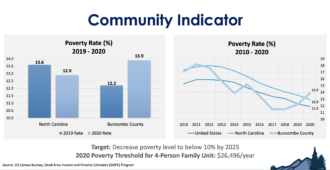
According to data presented by Tim Love, Buncombe’s director of economic development and governmental relations, the county’s poverty rate went up from about 11.5% in 2018 — its lowest point in a decade — to about 13.9% in 2020, the latest year for which information was available. Poverty in both North Carolina and the overall U.S. fell over the same period.

“Veterans have earned the care the Charles George affords them, but how much better would it be if we pursued peace and didn’t ask our citizens to participate in military actions the world over?”

“This raises the question of what funds are being used for advancing diversity, equity and inclusion and how they can be better allocated all around to create a positive cycle of change.”
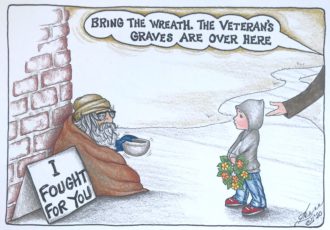
By Irene Olds

“We must recognize that as long as we prioritize more hotels, more restaurants, more new construction (none of which is wholly bad), we must also acknowledge the consequences of those priorities — the displacement of people on the margins — and find ways to sustainably address them.”

Looking back on 2017, Xpress highlights some of the hundreds of stories we covered in our print editions and online over the year.
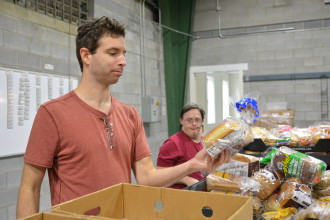
Food deserts —areas where people do not have easy access to large grocery stores — can occur in both urban or rural areas. Food deserts exist in many areas of WNC, including Asheville and Hendersonville. Malnutrition that occurs in food deserts can lead to poor physical and mental health.

“Naming the history of a problem in our black community does not discount the experiences of our rural white communities. It’s not an either-or argument. It’s an “and” discussion. And white, rural communities suffer from food insecurity, too.”

“The time has come for Asheville and Buncombe County to take advantage of the Invest Health opportunity, take charge and assess the extent of poverty, examine the history behind the concentration of poverty and, most important, to identify and plan for what needs to be done and how to do it.”

Caregivers and organizations in Western North Carolina — including community health centers, acupuncturists and herbalists — are helping people without insurance receive the care they need. Indeed, many providers say access to health care is a basic human right. People in every corner of the state should be covered and have access to care, says Benjamin Money, CEO and president […]
Buncombe County is taking new steps to alleviate poverty, and it’s looking to the community for ideas. Representatives of 22 organizations attended a July 15 Buncombe County Health and Human Services (BCHHS) meeting, where they learned of Buncombe’s new Request for Information (RFI) on poverty remediation. County leaders are interested in community practices to remedy poverty and are seeking information […]
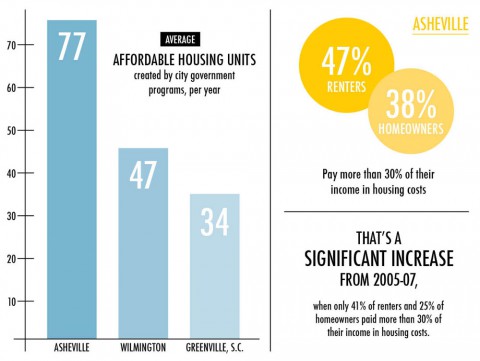
Report shines light on Asheville’s housing problems, possible solutions.
At a rare joint meeting yesterday evening, Asheville City Council and the Asheville City School Board conferred on the achievement gap, mutual priorities and the thornier social issues that complicate both their jobs.
Clustered around tables in the U.S. Cellular Center banquet hall during the first day of their annual retreat, Asheville City Council and city staff deliberated everything from affordable housing to surveillance. Here are a few highlights of their discussions.
Last week, the U.S. Conference of Mayors released an in-depth report examining the hunger and homelessness situations in 25 cities across the country, including Asheville. The report found that the city has serious issues with low wages, unaffordable housing, poverty, and the number of domestic violence survivors who end up homeless. Increases in homelessness are modest, but more families are homeless. The report also highlighted some local organizations doing “exemplary” work on the issues but predicted that coming social service cuts could make the situations on both fronts more dire.
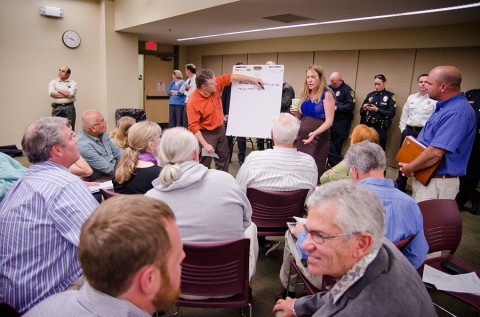
Attendees at a “downtown summit” this afternoon expressed concern about a variety of issues, including cleanliness, the homeless, affordability, and infrastructure in Asheville’s core. The forum was organized by city staff as an effort to gather input. (Photo by Max Cooper)